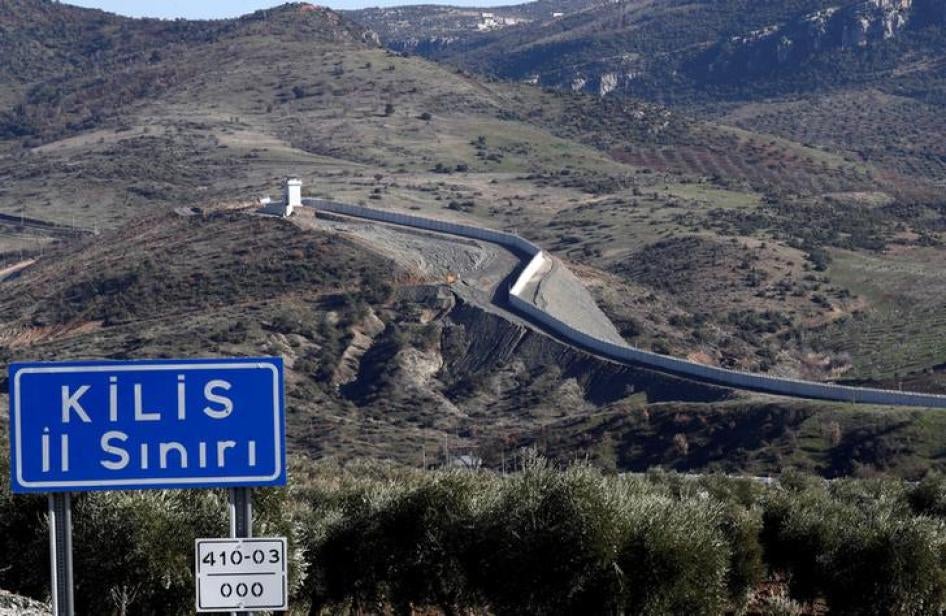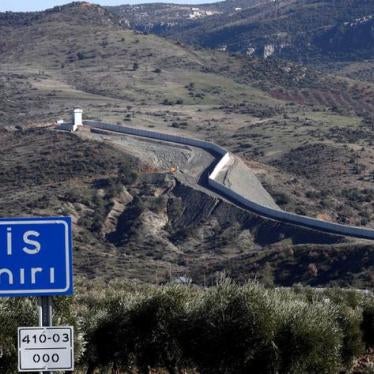(Beirut) – Turkish authorities are detaining and coercing Syrians into signing forms saying they want to return to Syria and then forcibly returning them there, Human Rights Watch said today. On July 24, 2019, Interior Minister Süleyman Soylu denied that Turkey had “deported” Syrians but said that Syrians “who voluntarily want to go back to Syria” can benefit from procedures allowing them to return to “safe areas.”
Almost 10 days after the first reports of increased police spot-checks of Syrians’ registration documents in Istanbul and forced returns of Syrians from the city, the office of the provincial governor released a July 22 statement saying that Syrians registered in one of the country’s other provinces must return there by August 20, and that the Interior Ministry would send unregistered Syrians to provinces other than Istanbul for registration. The statement comes amid rising xenophobic sentiment across the political spectrum against Syrian and other refugees in Turkey.
“Turkey claims it helps Syrians voluntarily return to their country, but threatening to lock them up until they agree to return, forcing them to sign forms, and dumping them in a war zone is neither voluntary nor legal,” said Gerry Simpson, associate Emergencies director. “Turkey should be commended for hosting record numbers of Syrian refugees, but unlawful deportations are not the way forward.”
Turkey shelters a little over 3.6 million Syrian Refugees countrywide who have been given temporary protection, half a million of them in Istanbul. This is more refugees than any other country in the world and almost four times as many as the whole European Union (EU).
The United Nations High Commissioner for Refugees (UNHCR) says that “the vast majority of Syrian asylum-seekers continue to … need international refugee protection” and that it “calls on states not to forcibly return Syrian nationals and former habitual residents of Syria.”
Human Rights Watch spoke by phone with four Syrians who are in Syria after being detained and forcibly returned there.
One of the men, who was from Ghouta, in the Damascus countryside, was detained on July 17 in Istanbul, where he had been living unregistered for over three years. He said police coerced him and other Syrian detainees into signing a form, transferred them to another detention center, and then put them on one of about 20 buses headed to Syria. They are now in northern Syria.
Another man, from Aleppo, who had been living in Gaziantep in southeast Turkey since 2013, said he was detained there after he and his brother went to the police to complain about an attack on a shop that they ran in the city. He said the police transferred them from the Gaziantep Karşıyaka police station to the foreigners’ deportation center at Oğuzeli, holding them there for six days and forcing them to sign a deportation form without telling them what it was. On July 9, the authorities forcibly returned the men to Azaz in Syria via the Öncüpınar/Bab al Salameh border gate near the Turkish town of Kilis. Human Rights Watch also spoke by phone with two men who said the Turkish coast guard and police intercepted them at checkpoints near the coast as they tried to reach Greece, detained them, and coerced them into signing and fingerprinting voluntary repatriation forms. The authorities then deported them to Idlib and northern Aleppo governorate.
One of the men, a Syrian from Atmeh in Idlib governorate who registered in the Turkish city of Gaziantep in 2017, said the Turkish coast guard intercepted him on July 9. He said [“Guvenlik”] “security” held him with other Syrians for six days in a detention facility in the town of Aydın, in western Turkey. He said the guards verbally abused him and other detainees, punched him in the chest, and coerced him into signing voluntary repatriation papers. Verbally abusive members of Turkey’s rural gendarmerie police forces [jandarma] deported him on July 15 to Syria with about 35 other Syrians through the Öncüpınar/Bab al-Salameh border crossing.
He said that there were others in the Aydin detention center who had been there for up to four months because they had refused to sign these forms.
The second man said he fled Maarat al-Numan in 2014 and registered in the Turkish city of Iskenderun. On July 4, police stopped him at a checkpoint as he tried to reach the coast to take a boat to Greece and took him to the Aydin detention facility, where he said the guards beat some of the other detainees and shouted and cursed at them.
He said the detention authorities confiscated his belongings, including his Turkish registration card, and told him to sign forms. When he refused, the official said they were not deportation forms but just “routine procedure.” When he refused again, he was told he would be detained indefinitely until he agreed to sign and provided his fingerprints. He said that the guards beat another man who had also refused, so he felt he had no choice but to sign. He was then put on a bus for 27 hours with dozens of other Syrians and deported through the Öncüpınar/Bab al-Salameh border crossing.
In addition, journalists have spoken with a number of registered and unregistered Syrians who told them by phone from Syria that Turkish authorities detained them in the third week of July, coerced them into signing and providing a fingerprint on return documents. The authorities then deported them with dozens, and in some cases as many as 100, other Syrians to Idlib and northern Aleppo governorate through the Cilvegözü/Bab al-Hawa border crossing.
More than 400,000 people have died because of the Syrian conflict since 2011, according to the World Bank. While the nature of the fighting in Syria has changed, with the Syrian government retaking areas previously held by anti-government groups and the battle against the Islamic State (ISIS) winding down, profound civilian suffering and loss of life persists.
In Idlib governorate, the Syrian-Russian military alliance continues to indiscriminately bomb civilians and to use prohibited weapons, resulting in the death of at least 400 people since April, including 90 children, according to Save the Children. In other areas under the control of the Syrian government and anti-government groups, arbitrary arrests, mistreatment, and harassment are still the status quo.
The forcible returns from Turkey indicate that the government is ready to double down on other policies that deny many Syrian asylum seekers protection. Over the past four years, Turkey has sealed off its border with Syria, while Turkish border guards have carried out mass summary pushbacks and killed and injured Syrians as they try to cross. In late 2017 and early 2018, Istanbul and nine provinces on the border with Syria suspended registration of newly arriving asylum seekers. Turkey’s travel permit system for registered Syrians prohibits unregistered Syrians from traveling from border provinces they enter to register elsewhere in the country.
Turkey is bound by the international customary law of nonrefoulement, which prohibits the return of anyone to a place where they would face a real risk of persecution, torture or other ill-treatment, or a threat to life. This includes asylum seekers, who are entitled to have their claims fairly adjudicated and not be summarily returned to places where they fear harm. Turkey may not coerce people into returning to places where they face harm by threatening to detain them.
Turkey should protect the basic rights of all Syrians, regardless of registration status, and register those denied registration since late 2017, in line with the Istanbul governor’s July 22 statement.
On July 19, the European Commission announced the adoption of 1.41 billion euros in additional assistance to support refugees and local communities in Turkey, including for their protection. The European Commission, EU member states with embassies in Turkey, and the UNHCR should support Turkey in any way needed to register and protect Syrians, and should publicly call on Turkey to end its mass deportations of Syrians at the border and from cities further inland.
“As Turkey continues to shelter more than half of registered Syrian refugees globally, the EU should be resettling Syrians from Turkey to the EU but also ensuring that its financial support protects all Syrians seeking refuge in Turkey,” Simpson said.









